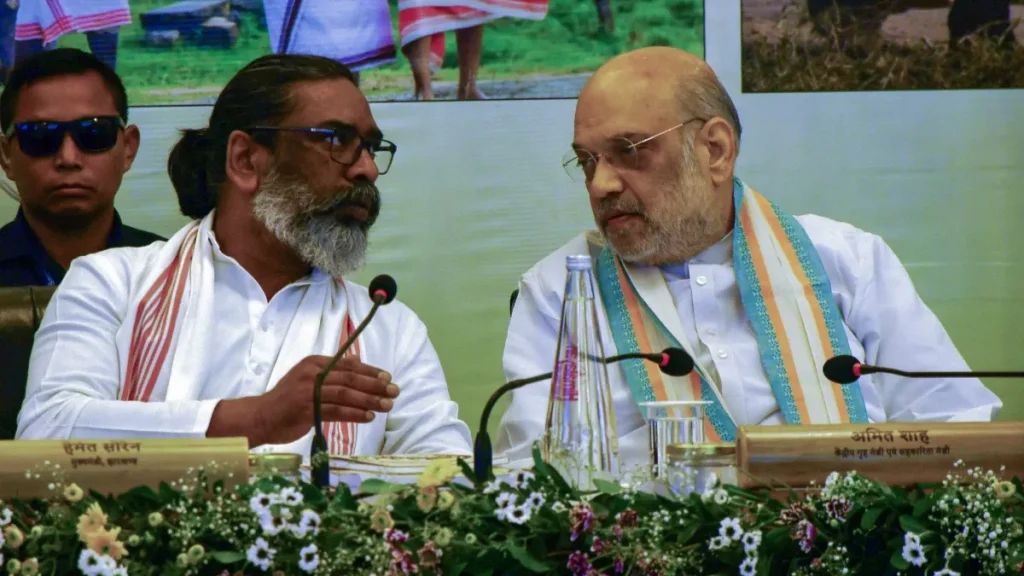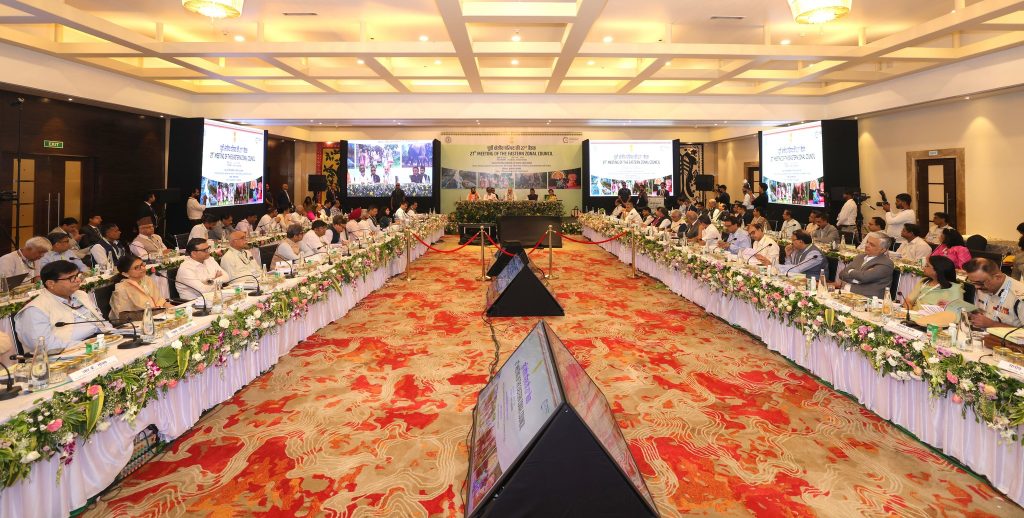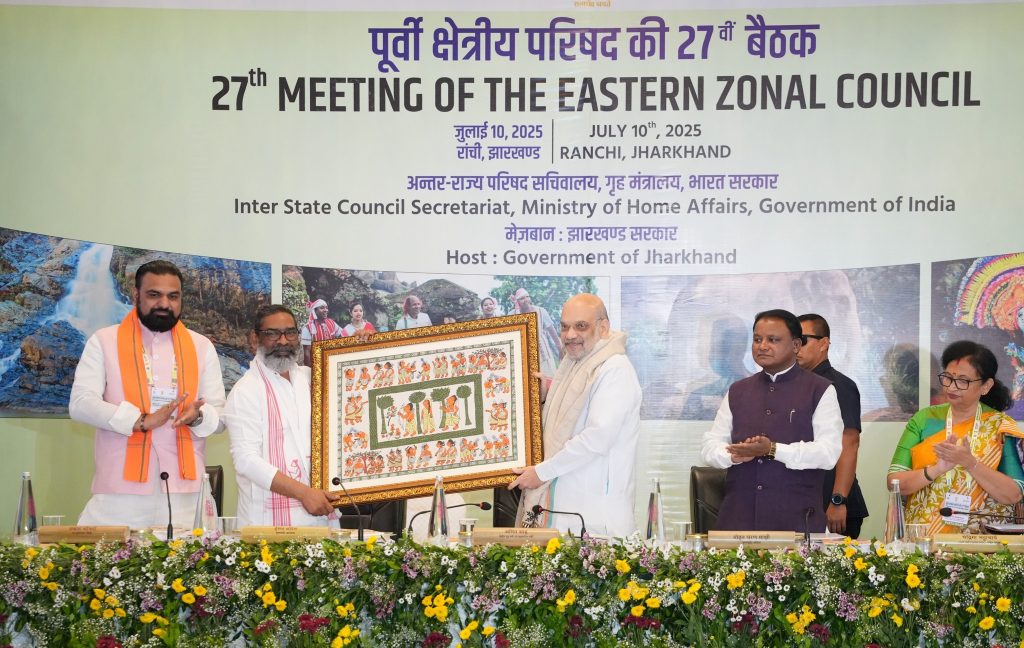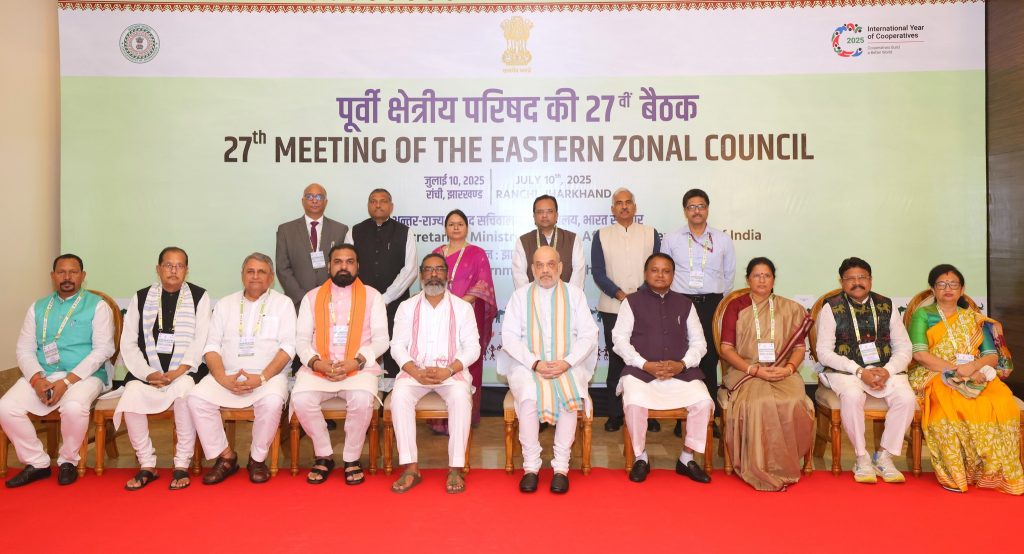Union Home Minister Amit Shah chaired the 27th Eastern Zonal Council meeting in Ranchi, highlighted 83% issue resolution since 2014. He announced plans to eliminate Naxalism by March 2026 and stressed on new criminal laws, narcotics control, regional cooperation, and development-focused governance.
Union Home and Cooperation Minister Amit Shah, while addressing the 27th meeting of the Eastern Zonal Council held in Ranchi, announced that the Central Government is determined to make India completely free from Naxalism by 31st March, 2026. The meeting, organised at a Hotel Radisson Blu, Ranchi, saw participation from several dignitaries including Jharkhand Chief Minister Hemant Soren, Odisha CM Mohan Charan Majhi, Bihar Deputy CM Samrat Chaudhary, and West Bengal’s Minister of State for Finance Chandrima Bhattacharya. Senior officials from the Centre and member states were also present.
Also Read: Mahuagarhi Coal Scam: Court Sentenced 3 Year Jail to Ex-MD, Imposed Rs. 1 Crore Fine to JICPL

83% Issues Resolved – A Sign of Productive Cooperation
In his address, Amit Shah emphasised that under the Modi Government, the pace and effectiveness of regional council meetings have improved significantly. While only 25 meetings were held between 2004 and 2014, the number more than doubled to 63 from 2014 to 2025. Out of 1,580 issues discussed in these meetings, 1,287 issues (83%) have already been resolved, a success rate that showcases the practical outcomes of cooperative federalism, according to the Home Minister.
Shah said, “We used to hold only two to three meetings annually earlier, but now we are regularly conducting about six meetings every year.” He added that the councils have moved beyond just discussion platforms and have now become “engines of cooperation” between Centre and states.
Naxalism to End by 2026, Said Amit Shah
Union Home Minster Amit Shah praised the joint efforts of security forces and states in tackling Left-Wing Extremism. He said that states like Bihar, Jharkhand, and Odisha have already become largely Naxal-free, and the remaining affected areas will also be liberated by 31st March 2026. He added that, “With the courage of our forces and unity among states, we’ve made tremendous progress. Now we are aiming for a full stop to Naxalism across the country.”

Meeting Focused on New Criminal Laws & Narcotics Control
During the meeting, Amit Shah called upon eastern states to implement the three new criminal laws at the earliest. He also directed states to strengthen their response to the drug menace, suggesting that district-level NCORD meetings (Narcotics Coordination) must be conducted regularly to ensure local-level enforcement.
Long-Pending Inter-State Issues Addressed
A number of long-pending issues related to water reservoirs and infrastructure such as the Masanjore Dam, Tayabpur Barrage, and Indrapuri Reservoir were taken up. The Centre and states discussed these matters in detail and agreed upon decisive steps for resolution. Other significant inter-state topics included the division of assets and liabilities between Bihar and Jharkhand, dating back to the state’s bifurcation. Shah confirmed that progress was made on several of these fronts with mutual consensus.
Focus on Development & Basic Infrastructure
The meeting also focused on women and child safety, especially the need for fast-track special courts to handle rape cases swiftly. Discussion was also held on bringing banking facilities to every village, improving nutrition, health, education, urban planning, and strengthening cooperative institutions. Shah encouraged states to revamp skill development programs by moving away from outdated structures and adopting need-based curricula tailored to today’s job market.
Also Read: Illegal Iron Ore Mining Network Busted at Chaibasa, Ex-CM Madhu Koda Demanded Strict Action

Tribute to Indian Soldiers, Rich Legacy of Eastern India
During the meeting, the council passed a resolution to thank India’s defence forces for their courage shown during Operation Sindhur. Shah praised the bravery, precision, and commitment of Indian soldiers, calling it a matter of pride for the nation. He also highlighted Jharkhand’s key contribution in India’s freedom struggle, recalling the legacy of Birsa Munda, Subhash Chandra Bose, Swami Vivekananda, Dr Rajendra Prasad, and Jagjivan Ram. He called Eastern India the “land of devotion, knowledge, science, and revolution.”
Background on Eastern Zonal Council
The Eastern Zonal Council includes Jharkhand, Bihar, Odisha, and West Bengal, and functions under the Inter-State Council Secretariat of the Ministry of Home Affairs. These councils were set up under the States Reorganisation Act of 1956 with the Home Minister serving as the chairperson. Every year, the vice-chairperson’s role is rotated among Chief Ministers of member states. The councils aim to resolve inter-state and centre-state issues through dialogue and consensus.
Also Read: BCCL Achieved Milestone by Reopening PB Project via MDO Model
Join the WhatsApp Group of Business Jharkhand to Stay tuned for all the latest updates of industrial-political developments in Jharkhand.


